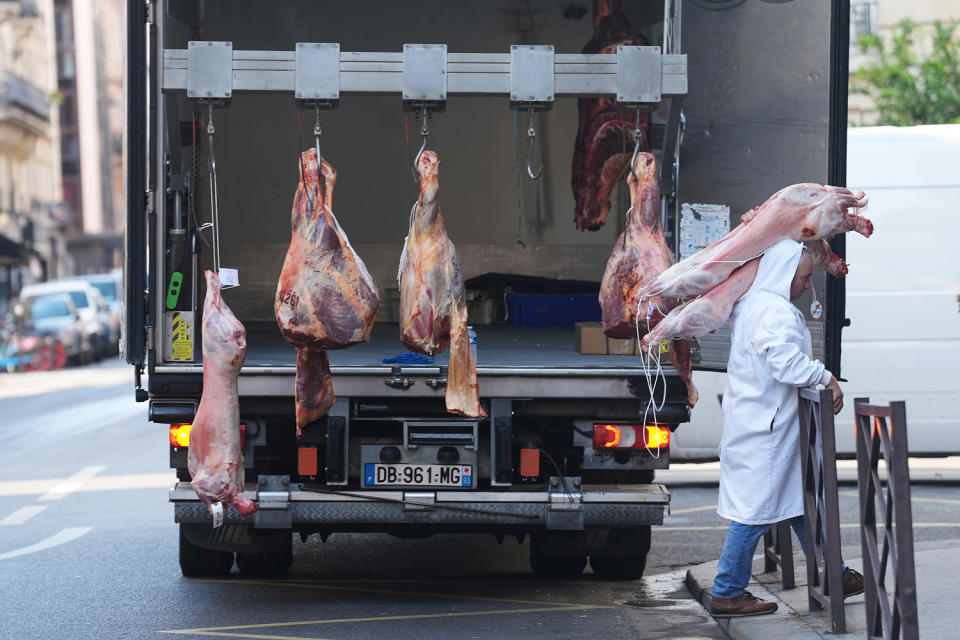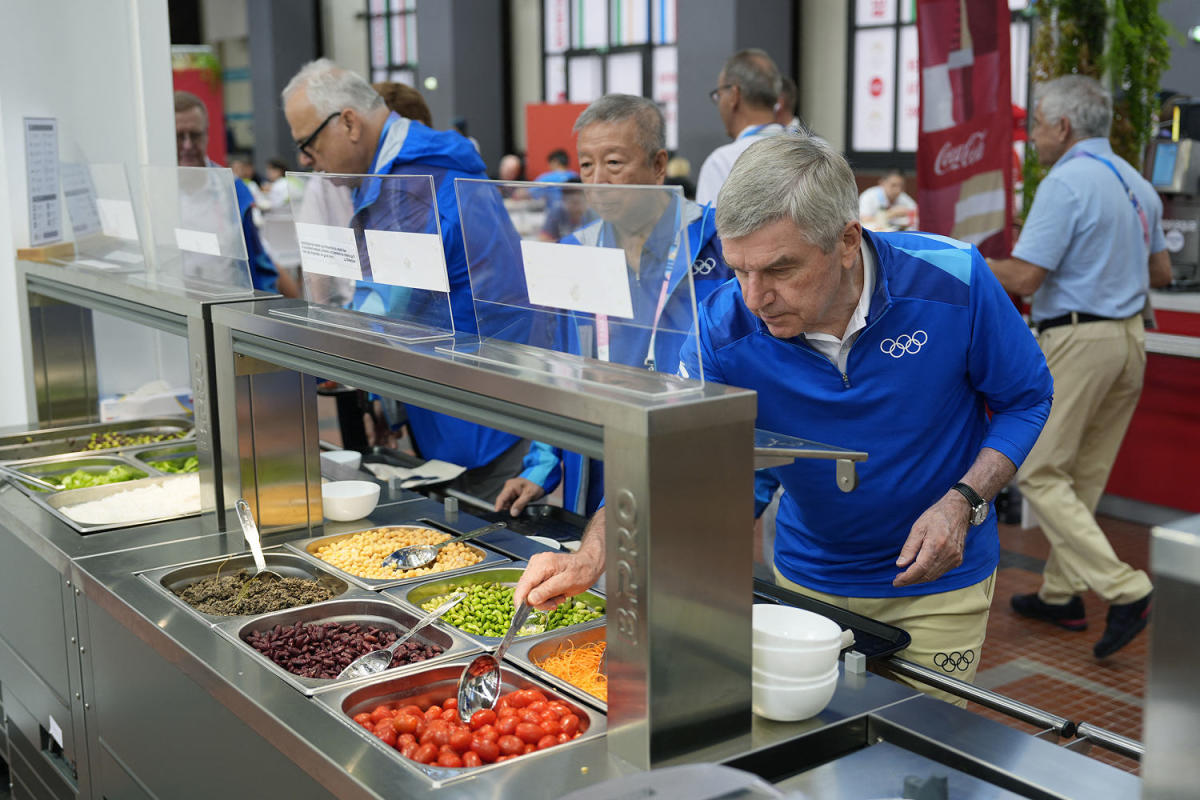PARIS – A few blocks from the Arena La Concorde, where Olympic athletes spent two weeks skateboarding, breakdancing and playing 3×3 basketball, lies an oasis of quintessential Paris.
Le Grand Colbert is a traditional brasserie with white tablecloths, high, decorative ceilings and opulent chandeliers. But what makes it undeniably French is the food: frog legs served with plenty of parsley and Provencal garlic butter; steak tartare (raw ground meat with raw egg yolk); and escargots Burgundy style, which is sea snails with, yes, more garlic and more butter.
But Paris 2024, now in its final days, has abandoned this gastronomic cliché in favour of something entirely modern. Although the Olympic Games are ostensibly about sport, they are also the largest catering operation in the world, serving around 13 million meals to athletes, spectators and officials.
In addition, it is also an opportunity for individual countries to convey their soft power image to the world.


Paris did this by creating a manifesto with a “vision of food” that sought to link France’s historically outstanding culinary quality with the need for sustainable food supplies to combat the climate crisis.
As it turned out, this approach was not universally accepted by athletes. Some complained about the lack of protein in a diet that promoted plant-based alternatives; others complained about poor quality, and a few reported raw or worm-infested food.
This raises doubts as to whether the Games’ gastronomic ambitions were successful.
“Every country sees such events, whether the Olympics or the World Cup, as an instrument of soft power,” says Loïc Bienassis, a food historian at the European Institute of Food History and Cultures at the French University of Tours. “Perhaps it was obvious to promote French cuisine, but they also wanted to show that in France we are also able to take the sustainable aspect into account.”
In this inherent back and forth between meat-loving French cuisine and sustainable plant-based diets, Bienassis said Paris 2024 clearly favors the latter.


“I don’t think the traditional aspects of French gastronomy are really promoted during the Olympics,” he said. “There is a lot of meat in French cuisine, so there is a tension with the environmental aspect,” he added, adding that it is the environment that “is clearly much more important in their eyes. And why not?”
Eating animals is far more harmful to the environment than plant-based alternatives. It uses more land, water and energy than growing crops for humans. According to the University of Oxford’s statistical publication Our World in Data, cattle alone emit 106 billion kilograms of methane into the atmosphere every year. Methane has a global warming potential 27 times higher than carbon dioxide.
And so at Paris 2024, 60% of the dishes served to guests were meat-free and 30% were sports food. In the village, the catering giant Sodexo Live! was commissioned to produce 500 recipes on the themes of France, Asia, “Africa-Caribbean” and “world cuisine”.
According to Paris’ food vision, the aim of hot buffets and salad bars was to “expand and highlight the range of vegetarian dishes”.
These efforts were not without sharp criticism.
Several countries complained that there were not enough eggs and grilled meat. The British team went even further: its managing director said the athletes were being served raw meat. British swimming star Adam Peaty reported that some of the fish contained “worms”.
“The food is not good enough for the level of performance expected of the athletes,” he told the British newspaper i. “The sustainability narrative is simply being forced on the athletes,” he said. “I want meat, I need meat to perform and that’s what I eat at home, so why should I change it?”
And the US team gymnast, Hezly Rivera, gave a negative assessment of her own.
“I definitely like French food, but what we have there is not the best in my opinion,” said the 16-year-old, but added that “it serves its purpose.”
Regarding the allegations regarding raw food and worms, Paris 2024 stated in a statement that the association was “subject to regular checks by the food safety authorities”, but in light of the complaints it had also commissioned a private company to carry out additional checks.
The protein shortage was due to the “significant demand” in the early days. “Certain foods such as eggs and grilled meat were particularly popular with athletes and were therefore offered in larger quantities.” Meanwhile, Sodexo Live! announced that the quantities of eggs and grilled meat were “immediately increased” after complaints about shortages and that for over a week “these products have been sufficient to meet demand.”
Paris 2024 added that it was “never a question of vegetarian objectives” taking precedence over the “nutritional needs and habits” of athletes.
Team GB said it was not aware of any further cases of raw or worm-infested food and referred NBC News to Paris 2024 for further comment.
It wasn’t just environmental concerns that motivated this attempt at a culinary revolution.
French Michelin-starred chef Alexandre Mazzia says the stereotype of French bistro cuisine is outdated and does not represent the country’s multicultural, diverse dining scene.
In fact, on another afternoon this week, NBC News stood in line for 20 minutes just to grab a sandwich from the pan-European-famous L’As du Fallafel in the Marais, Paris’ historic Jewish quarter. The fully loaded pita bread did not disappoint, bursting with fried chickpea patties and heaps of hummus and pickled red cabbage.
This eatery is just one of the Jewish, Arab and North African offerings on these winding, cobbled streets, an aspect of France under considerable pressure as the far right makes electoral gains on its platform of staunch opposition to immigration and multiculturalism.
Mazzia himself was born to French parents in the Republic of Congo. The former basketball player is one of three superstar chefs, along with Akrame Benallal and Amandine Chaignot, who have their own “corner” in the Olympic Village and serve 600 dishes every day on Sundays and Mondays.
And so NBC News interviewed Mazzia about his philosophy after he sampled frog legs and steak tartare at Le Grand Colbert and before waddling across town to cover a basketball game.
“I think frog legs and steak tartare are almost traditional dishes that no longer represent French gastronomy,” he said. “It’s perhaps a cliché of French cuisine” and “I didn’t even think about proposing this type of dish for his menu,” he said.
Instead, he serves exciting dishes such as hake with spices and tapioca, minced meat with liquorice black rice and risotto with green beans, blackberries and blackcurrants.
“French cuisine has evolved enormously,” said Mazzia, who “wanted to represent modern France, the France of today, not the France of the past.”
“French cuisine has evolved, it is lighter, more plant-based,” he added, but above all it is “simply exceptional and at the same time full of surprises.”
This article was originally published on NBCNews.com.

